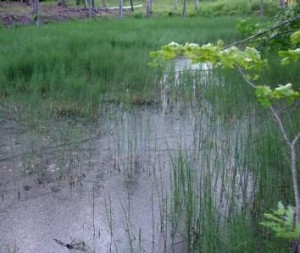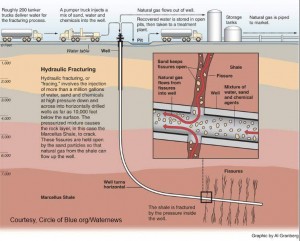 Water is a natural resource and a necessity for life, for every man, woman, child, plant and animal on our planet, to survive. It is that liquid which falls upon our planet as rain and feeds our seas, lakes, rivers and is the main component of all living matter. We know that pure water is colorless, odorless, tasteless, transparent and is made up of hyrdogen and oxygen, H2O. So why is ‘hydraulic fracturing‘ a huge concern?
Water is a natural resource and a necessity for life, for every man, woman, child, plant and animal on our planet, to survive. It is that liquid which falls upon our planet as rain and feeds our seas, lakes, rivers and is the main component of all living matter. We know that pure water is colorless, odorless, tasteless, transparent and is made up of hyrdogen and oxygen, H2O. So why is ‘hydraulic fracturing‘ a huge concern?
The idea of creating wealth and prosperity sounds great, on the surface. Money to go around for everybody in varying amounts. So, what lies behind this industry that has people concerned? Drilling holes for gas and oil doesn’t seem so horrible. We dig holes for water wells. There is a difference though. Drilling for oil and gas use chemicals and create permanent, toxic, waste water which can greatly affect clean water sources and all life forms.
Our Earth has naturally formed water aquifers. Groundwater that is contained at varying depths underground, with permeable material (sand, clay, gravel) and non-permeable rock. They have been used for thousands of years by Man as water sources. This water is near clean since it’s gone through ‘nature’s own filters‘ such as sand, gravel, clay and rocks. It’s considered ‘potable‘ water.
Potable : fit for drinking
A big oil or gas business decides they will start to drill using ‘hydraulic fracturing’, with government approval. A part of the drilling process includes pumping of sand, water and ‘additives’ at very high pressures, to keep the thermal friction of the drill bit down and hold ‘fractures’ open. They will and do, find one of these aquifers. They won’t have pumping or additives while they send this drill further till they hit the bottom of the aquifer.
Seals, usually concrete are then added around the drill pipe at the bottom of the aquifer. It is assumed this will stop and/or prevent ‘contamination‘ of the aquifer. Drilling below the aquifer continues and ‘additives’ in the solution are once again, added. Additives that are used, are as follows :
- Acid to clean ‘cement’ in pre- perforated (temp sealed) pipes
- Hydrochloride acid (HC1), used in pools
- Corrosion inhibitors
- Radioactive isotopes (to track flow, short lifespan)
- Sintered bauxite (proppant, keep flow open, allow flow of fluids)
- Zirconium oxide (proppant, keep flow open, allow flow of fluids)
- Gluteralheride (prevent bacterial growth)
- Potassium (and other salts, clay control)
- Peroxydisulfates (a ‘breaker’, breaks down gelling viscosity, increase ‘flow’)
- Scale inhibitors (prevent high concentrations of calcium sulfate, carbonate + barium sulfate)
A few concerns are, there is not enough long term research available with the effects on full mixtures of the chemicals used. It’s said, there’s only a tiny percentage of chemicals used but fail to mention – used EACH day of operation. How much does 0.01-0.001% of chemicals per day add up to, per month? three years? Over the life of a typical gas well, up to 100,000 US gallons (380,000 l; 83,000 imp gal) of chemical additives may be used.
Acid used to ‘open‘ temporarily ‘cement‘ sealed pipe perforations- could, or how would, this particular chemical, over the long term, affect concrete seals, in an underground aquifer? A sample of some unanswered questions. A big business will say that ‘patents‘ need to be protected which would provide detailed lists of chemicals used therefore closed to the public, for closer examination.
Creating fractures in the Earth may provide exit portals for other gases such as methane, benzene, radon or other volatile compound emissions (Encana Gas Leak). Not to mention, fractures may occur towards an aquifer- since there is no real control, in directing a fracture. Is there safeguards in place for such ‘leaks’? Speaking of leaks, what about the leaks that occur over time in the pipes themselves, from deterioration? What about slurry overflow, from wastewater pools? Direction of slurry flow in rain? Or effects on migratory birds swimming in open pools of wastewater due to addition of rain? Evaporation from these wastewater pools? What of the risk of sinkholes? Blowouts?
Drilling near natural fault lines has also caused earthquakes. Siesmologists and monitoring equipment is kept nearby or on stand-by. Most micro-earthquakes may not be taken too seriously by the industry but is a concern to people. What if a fault is ‘fractured’ that releases pressure causing a massive quake? Would wastewater pits survive such a catastrophe? Or any natural disaster that may come along?
A few recommendations made by people have been as follows:
- make full disclosure of chemicals mandatory
- results for full cumulative effects on groundwater, surface water and air
- politics and other bodies not interfere, sway or disrupt Environmental studies
- full water cycle be studied, water to air to ground and back
- soil, water and air be continuously monitored near and around these industries
- remove profit and financial concerns, make environment a priority
- strict alcohol and drug testing on workers, to prevent accidents
- Environment protection be provided transparency and accessibility
- explore improving treatment of frack water (evaporation, pyrolysis, too expensive)
- have spill projections and protections in place before a spill
- monitor long term effects of chemicals used
- priority on risk vs benefits
- report of gas emissions from frack water should postpone or halt drilling
- report hazardous waste should be public priority
- state of health ong term reports for those living near drilling sites be monitored
- report rate of well failures
- report long term effects of abandoned wells
- report effects of well sites in high rain climates
- priority on ensuring concrete ‘seals’ are not leaking (Gas Migration Update)
- require pre-drill water, soil and air tests for comparison testing
- require wastewater treatment before disposal
- require baseline contamination levels of water sources before drilling starts
- use cleaner bio-degradable chemicals
- intesify penalties on violations
- remove exemptions on use of dangerous hazardous chemicals
- ensure water use for whole area of population cannot be compromised
- non-disclosure agreements for drilling operations should be removed
I would prefer that we live in a world, that is able to provide clean water for our homes, farms and gardens. We can turn on the taps for drinking or enjoy watching birds and wild critters at the lake. It is a major resource that should receive 100% of our full attention and protection. If there’s any type of apocalyptic world coming, it would be a poisoned environment.
I hope you found this article informative. Please feel free to leave your comments and share your own observations or experiences. Use the ‘Ask a Question’ form on a topic of your own interest. It is FREE to subscribe by email or RSS feed.
Article(C)2009 An Informal Cornr, all rights reserved. Ginsense writes articles on business skills, development, health, science, technology and society and enjoys advocating for independence, security and a better world for all of us.

